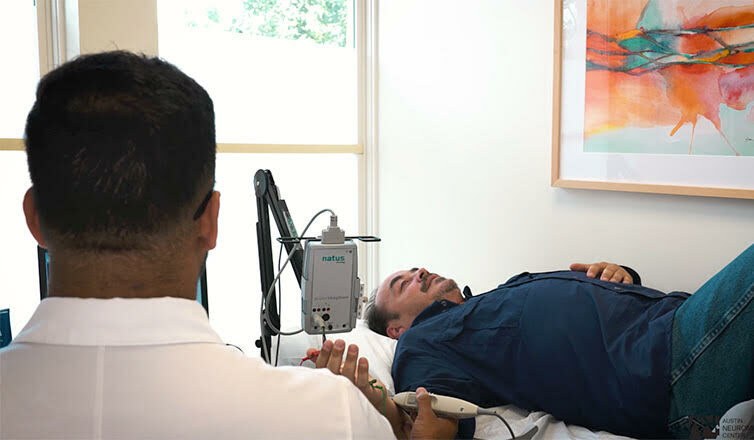When a patient comes to Austin Neuromuscular Center with numbness, tingling, pain, weakness or muscle cramping, an electromyography (EMG) may be used to evaluate the presence, location and extent of a neuromuscular disorder.
An EMG measures electrical activity in the muscles during rest, slight contraction and forceful contraction.
During EMG testing, a physician inserts a very thin needle (electrode) through the skin and into the muscle. Next, we ask you to either contract your muscles or keep them relaxed while the electrode detects electrical activity.
A nearby monitor displays the results in the form of waves and audible sounds. The size, shape, and sound of the waves provides information about the muscle as well as the connection to nerves.
EMG testing and nerve conduction studies (NCS) are performed alongside one another to identify the presence, location, and extent of diseases that damage the nerves and muscles. A nerve conduction study (NCS) test identifies nerve damage by measuring the amount and speed of conduction of an electrical impulse through a nerve.
The combined EMG and nerve conduction testing (EMG/NCS) typically take around an hour. When the EMG/NCS is completed, one of our physicians will review the results with you.
Preparation for EMG/NCS is minimal. Fasting is not required. Some medications like pyridostigmine (used to treat myasthenia gravis) may interfere with testing and need to be held, though most patients should not stop taking medications, including any type of pain medication. It is important to let your doctor know if you are taking aspirin or any blood thinners, have a pacemaker, or have a bleeding disorder so that precautions can be taken during testing.
EMG/NCS patients should shower as close to the appointment time as possible to remove all natural oils from the body and avoid using any lotions, oils or powders on the day of the test. We recommend that you wear clothes that permit access to the area to be tested.
Some people may find an EMG/NCS uncomfortable or may experience muscle soreness for a day or so after the procedure. Most patients, however, including children, tolerate the procedure well.
The results of the EMG/NCS will help your doctor to take necessary steps to manage your condition. Austin Neuromuscular Center uses EMG/NCS to diagnose neuromuscular diseases, nerve injuries, and degenerative conditions, including:
- Amyotrophic lateral sclerosis (ALS)
- Brachial plexopathy
- Carpal tunnel syndrome
- Cervical radiculopathy
- Guillain-Barre syndrome
- Lambert-Eaton myasthenic syndrome
- Lumbosacral radiculopathy
- Muscular dystrophy
- Myasthenia gravis
- Peripheral neuropathy
- Polymyositis
For more information, contact us at (512) 920-0140. And don’t forget to follow us on Facebook, LinkedIn, Twitter and Instagram for important updates.
